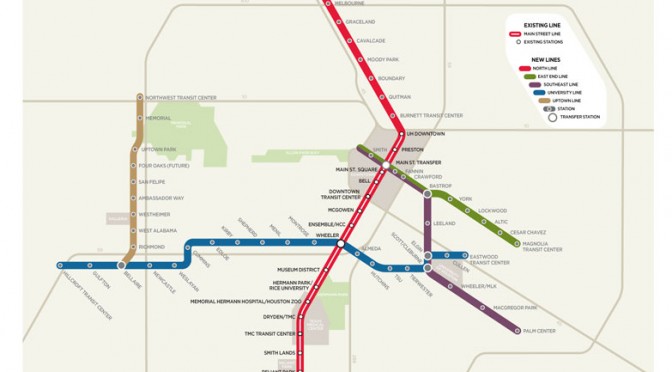As we continue to disseminate the long arms of the 2012 election, one particular result has altered the immediate future for Houstonian… The METRO referendum passed by an impressive margin. What’s good about the result is that it shows Houstonians support their public transit.
But the “devil” of this decision was in the details. The 2012 referendum was specifically designed to improve Houston streets, busses and bus transit infrastructure (bus shelters, signage, etc). None of the money can be used to build rail, and it essentially “frees” METRO from the bounds of the 2003 referendum. Thankfully the North, Southeast and East End lines should be completed as scheduled, but the future of the Uptown and University Lines are more uncertain than ever.
And let’s cut to the chase here… The referendum really wasn’t about METRO. This referendum was a deal that the board basically had to cut with the multi-cities… The small municipalities with Metro’s tax base such as the Villages, West University, Bellaire and others. Under the current tax structure, which was set to expire had this referendum failed, the multi-cities get tons of extra tax revenue to use to build their sidewalks and maintain their roads. They get more money than they pay in… in some cases, WAY more… while Houston residents LOSE money paying for their street upgrades. So make no mistake… The most important thing that was passed on November 6th was the ability of the multi-city governments to keep ciphoning from Houston’s tax base. Less rail and less money? Sounds like a ‘win-win’ to me.
But here’s what some Houstonians don’t recognize… Transit is not, and never will be an “either or” proposition. It’s not even today. Our city is the fourth largest in the United States… well over 2.2 million people, and still growing everyday. Our economy, thankfully is one of the strongest in the nation, and it shows no signs of slowing down. After a 2012 that saw Houston lead the United States in job growth, all signs indicate that 2013 will be an even stronger year.
And you know what else all of those signs indicate? TRAFFIC.
If you live in or have been recently to Houston, no one has to tell you that this city’s infrastructure is under immense stress. Even though we’re currently third in the nation for number of freeway miles per capita, we still don’t have enough room for all of the cars and people yet to come. Though we already spend more money per capita for road maintenance than any of the other top 10 US cities, our streets are still on the verge of crumbling.
We wear out our roads more than any other major city for one simple reason… Because we are so tragically far behind on alternative modes of transportation (i.e. RAIL). Houston is nearing a crisis point of how to manage its infrastructure. We can no longer afford to be a one-trick pony and rely solely on freeways to get around. The roads can’t take it, and the drivers don’t have enough time to wait.
The improvements to Houston’s bus system are sorely needed and will be welcome. It’s past time that critical bus investment is achieved. But as a city, Houston can’t drop the ball on comprehensive solutions to our transit needs. On November 6th, the citizens of Houston made vast commitments to the future of our city, passing record improvements for the Houston Independent School District, Houston Community College and yes, Metro busses along with the General Mobility Program. But these are just some pieces of the puzzle, and we continue to drag our feet on a very crtical part. If the local funding for rail is no longer a possibility, the next step for transit supporters is to go to Washington. For those concerned, now is the time to contact Congress members like Sheila Jackon Lee, Al Green, Gene Green and John Culberson to put Houston transit back on the agenda. Once the Fiscal Cliff situation is solved, infrastructure improvements are sure to be a top-level priority of the new (and decidedly more Democratic) Congress. Hopefully our Congressional Representatives will continue to fight for the sustainable growth of Houston.
Our future depends on it.

